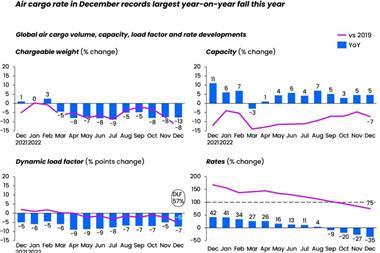Any hopes of a surge in air cargo demand ahead of the Chinese New Year/Lunar New Year holiday appear to have faded as economic pressures continue to put the breaks on consumer spending.
The two-week holiday this year falls on January 22 but industry players are not expecting to see the usual increase in demand as factories close for the two-week holiday.
Scan Global Logistics global head of airfreight David Wystrach said that the holiday is expected to have a limited effect on the market.
"Stock levels seem to be looking good, even after Christmas sales," Wystrach said. "This is another reason why the expectation is only a limited uptick in demand after Chinese New Year."
Paul Rombeek, head of airfreight Europe Middle East Africa, Flexport agreed that there were no signs of a surge in demand ahead of the holiday.
"Demand from Northern Asia remains low and a peak in volume before the Lunar New Year holiday remains unlikely," Rombeek said. "Transpacific eastbound rates have dropped while Far East Westbound rates hold at low levels.
"From Southern China, demand and rates have decreased and some factories have already begun taking off for Lunar New Year."
Rate data provider TAC Index said rates were trending downwards, which seems to confirm the lack of a Chinese New Year rush.
There are, however, some indications that factories were preparing for a rise in Covid cases after the holiday due to more mixing as people return home for the break.
"There were no signs yet of any rise towards a ‘mini peak’ ahead of Chinese New Year, with outbound Shanghai [rate index] falling steeply by 10.3% week on week leaving that index down 40.8% year on year," TAC Index said in its weekly market summary.
"Some sources said Chinese suppliers were ramping up production ahead of a potential rise in infections over Chinese New Year, though others suggested local Covid levels may have already peaked in December."
Data provider CLIVE also identified the potential impact of rising Covid cases: "What lies ahead remains uncertain. After a surprisingly strong start for the air cargo market in January 2022, this new year will likely be impacted by the earlier Chinese New Year and growing concerns of rising Covid levels which, in China, is already impacting some factory production."















